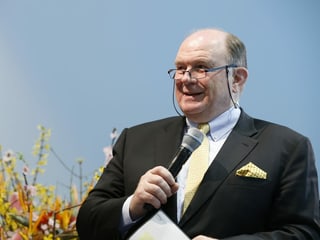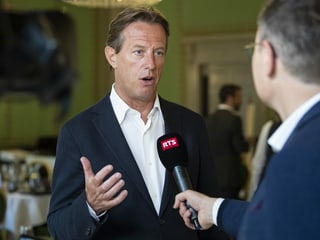It’s about mandates, work and a lot of money: Certain parties are closely linked to the banking world. An overview.
The parties have started to blame themselves for the current CS crisis. So the commoners blame each other for the debacle. “A consequence of mismanagement and FDP felt,” says the SVP, for example.
How strongly are the parties connected to the banking industry? Both the FDP and the SVP are relatively close to the banks: According to the online platform Lobbywatch, 14 members of parliament are directly or indirectly linked to a bank, an investment fund or a corporation. This shows that the SVP currently has the most direct connection to the industry in the national parliament.
Which important bank representatives are members of a party?
Historically speaking, does the classic banking party exist? Oliver Huwyler researches the behavior of parliamentarians and lobbying. In the one financed by the Swiss National Science Foundation Research project “Parliamentary Careers in Comparison” he dealt with the development of interest groups in Swiss politics. The study of members of the national parliament over the period 1985 to 2017 illustrates that the financial industry has adapted to changing party strengths.
Before 2000, the FDP and CVP were clearly the parties that had the most representatives of the financial industry in their ranks. Over the years, however, the SVP’s connections to the industry grew. In the opposite direction, the interests of the then CVP parliamentarians decreased overall.

Legend:
From left: The party or faction presidents Balthasar Glättli (Greens), Tiana Angelina Moser (GLP), Thierry Burkart (FDP), Gerhard Pfister (middle), Thomas Aeschi (SVP) and Mattea Meyer (SP), on the occasion of a presidential round for the Federal Council election from December 6, 2022 in Bern.
KEYSTONE/Peter Schneider
To what extent does the interest group influence the members of the Federal Assembly? In the Studie «No Representation Without Compensation» Huwyler, together with Tomas Turner-Zwinkels and Stefanie Bailer, was able to use mass data from 2000 to 2015 to show that the relationships between members of the Federal Assembly and interest groups are transactional. This means that the connections have a direct connection to parliamentary initiatives and the behavior of MPs as long as the interests are linked. “It’s a double-edged sword,” says Huwyler. On the one hand, these connections would serve the rapid flow of information to Parliament. “On the other hand, there is a two-class system: only certain groups enjoy this privileged access, which benefits their interests”.
Who donates how much to the parties? This is exactly the question SRF, together with RTS, investigated in a large-scale survey before the 2019 elections. The top 100 companies based in Switzerland, the top 25 banks and the top 15 insurance companies were asked. Almost 30 percent of the banks stated that they regularly pay financial contributions to parties or members of parliament.
With a maximum annual amount of one million Swiss francs, CS made the largest contribution to date. She supports parties that have at least five seats in the Federal Assembly and looks at the number of parliamentary mandates, it was said at the time. Not much behind is UBS, which supports parties “who are committed to the market economy, competition and the Swiss financial center”. At the end of November, a bank spokesman confirmed to CH Media an amount of CHF 750,000 for 2022.







